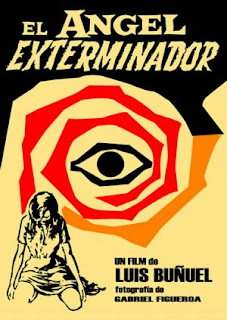 As a film about a large group of characters trapped in a single room in a mansion, Buñuel’s mise en scène here has just as much opportunity as his symbols and ideals. Locking the characters into a single room (and the size of the room isn’t exactly adequate for the dozen+ guests) the camera is also isolated in the room, and, therefore, also the viewer. Or… not exactly. A fatal flaw in Buñuel’s découpage of Exterminating Angel is that the viewer is not confined to the room like all of the guests. The camera, on a few occasions, is propped in the adjacent dining room, looking in at the prisoners, as if to mock them. And later, the film takes us outside the actual mansion, to see, and spend a bit of time with, the public, press, and security, who are aware that there are many people in the mansion, and that they have been there for a very long time. This kills me, because it eliminates one of my favorite ideas from the former half of the film, which is that the outside world could be just as psychologically ‘off’ and physically trapped as they are; or better yet, that the world has reached a full-blown apocalypse. Sure, this is probably just not what Sr. Buñuel had in mind. He wants to poke fun at the bourgeois, at societal conventions, and religion. And all of these themes are presented very, very well in this film. But, oh, how it could have been so much more!
As a film about a large group of characters trapped in a single room in a mansion, Buñuel’s mise en scène here has just as much opportunity as his symbols and ideals. Locking the characters into a single room (and the size of the room isn’t exactly adequate for the dozen+ guests) the camera is also isolated in the room, and, therefore, also the viewer. Or… not exactly. A fatal flaw in Buñuel’s découpage of Exterminating Angel is that the viewer is not confined to the room like all of the guests. The camera, on a few occasions, is propped in the adjacent dining room, looking in at the prisoners, as if to mock them. And later, the film takes us outside the actual mansion, to see, and spend a bit of time with, the public, press, and security, who are aware that there are many people in the mansion, and that they have been there for a very long time. This kills me, because it eliminates one of my favorite ideas from the former half of the film, which is that the outside world could be just as psychologically ‘off’ and physically trapped as they are; or better yet, that the world has reached a full-blown apocalypse. Sure, this is probably just not what Sr. Buñuel had in mind. He wants to poke fun at the bourgeois, at societal conventions, and religion. And all of these themes are presented very, very well in this film. But, oh, how it could have been so much more!
Releasing the viewer into the dining room does nothing positive for this film. In Stalker, Tarkovsky blows your mind by thrusting you into The Room that our three protagonist’s cop out on entering. Sitting in the Room, for who knows how many minutes, with the water leaking in around the camera, is as close to a religious experience as an unreligious viewer can get. Thus, placing the camera, the viewer, in this space that the characters are unable to enter gives the viewer a sense of power, and also a bit of knowledge and perspective that the characters will not have; a kind of dramatic irony of space. In Angel, looking in from the dining room at these characters, who may as well be looking in to a literal fourth wall, we have a sense of power over these characters, and we have that perspective, too. But there is no revelation or satisfaction that comes from this hierarchy of control, because the viewer isn’t the one who is willing himself into ‘the outside,’ the one overcoming this psychological, environmental, spatial crisis; it’s Buñuel. We are able to escape the room because his camera says we can. Once we are allowed outside of the mansion, too, the confinements of space no longer matter, and are no longer interesting. We become purely spectators to this crisis instead of participants. There’s a ton of enjoyment in this as a spectator, but the game was so much more fun when it was more than that.
